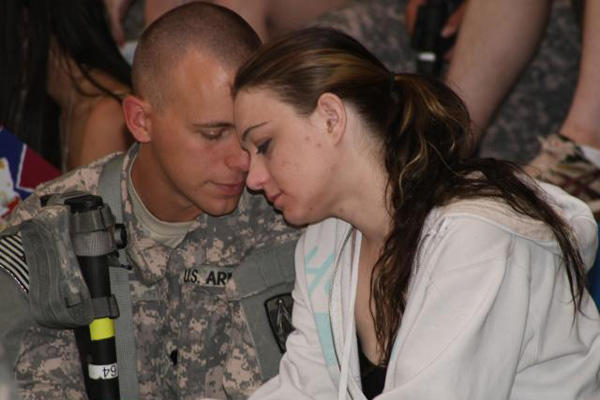Effects of Stress
As a couple, it's important to understand up front how stress can impact your relationship. Even before your service member leaves, consider learning about the common effects of a deployment. Understand that you and your service member may have less patience with one another while he's deployed. You will both be under additional stress, and your communication will be limited. If you head into your time apart realizing that your demeanor toward one another may be impacted not by your feelings for each other but instead by the circumstances of the deployment, you won't take it personally when you're on the receiving end of a curt tone of voice or short temper.
If you've been through a deployment or two, you already know this, which is one of the reasons we encourage more experienced spouses or partners to take newer spouses or partners "under their wings" to show them the ropes. Learning how to not take personally the change in temperament during a deployment is one of the hardest lessons to absorb.
"One afternoon, we walked through the house and I took notes about all the different things to remember to do. Things that he normally does—everything from tricks to get the A/C filter to sit in the slot easier to mixing the gas and oil in the weed eater to how to check the air in the car tires. A lot of the things I already knew how to do, but I don't normally think of because he takes care of them. We went through all of our legal paperwork and sat down with our financial planner to be sure everything was in order. Allowing him to show me these things—even if I already knew them—helped him feel better, knowing he had prepared me."
—Army spouse
Bolster Your Support Network
Identify your existing support system: friends, family, and the unit's family readiness group. Now consider how you can add to this network. For example, you can find peers with common interests in your area through Meetup groups at www.meetup.com. The more support you have, the better.
"A lot of wives have their own ‘battle buddies'—that other wife/spouse that is in the same situation (i.e., spouse deployed, kids of similar age, etc.). We team up and support one another in any way possible. No one can do it alone."
—Army spouse
"I have a ‘Mastermind Deployment Team' that supports me and my children. Whether it's a daily visit on the phone or text, they reach out and I reach out to share my day—good, bad, or ugly."
—National Guard spouse
Some spouses find the peer support they need through online support groups and message boards. Connecting to other military families and resources online is a helpful alternative to in-person events because of the geographic dispersion of military families. Additionally, many families have small children or work hours that make it hard to plan group activities. Facebook (www.facebook.com/ BlueStarFamilies) has become a very popular place to connect with other spouses as well as to find and share resources. Try searching for both national and local spouses' groups as well as base or location-specific groups for local activities and events.
"Social networking is key: friends, family (adult conversation), doing something with someone, or talking on the phone every day. I know I cannot do it alone and being aware of my strengths and weaknesses is critical. I ask for help when I need it."
—Army spouse
"Living on post, my neighbors and I were able to develop our own little family together. With our husbands away, we learned to depend on one another instead. We shared babysitting and pet-sitting responsibilities. We helped each other hang curtains. We ran to the store for each other. We noticed when someone hadn't been out of their house for the day; when it was 3 p.m., we'd make a call to check and make sure everything was okay. When bad things happened, we stepped up to be one another's support system."
—Army spouse
A word of caution: You may want to be careful about whom you bring into your inner circle of friends at this time in your life. The last thing you need are people who make tremendous demands on your time or energy. Nor do you need people in your life who are chronically negative. You may want to identify people who are toxic to your overall well-being. This can be done by assessing whether time spent talking to or being around this person invigorates or drains you. If it's the latter, then he or she is probably not someone you will want to have as a member of your support network. Remember, you are building the foundation for your entire deployment period.
|
Concerns Regarding Civilian Employment If your loved one is a member of the Guard or Reserves, she might be concerned about the status of her job during deployment. Remind her that there are laws protecting veterans' employment and re-employment rights, guaranteed by the Uniformed Services Employment and Reemployment Rights Act of 1994. For more information, refer to the Employer Support of the Guard and Reserve site at www.esgr.org. |
This excerpt is provided courtesy of the acclaimed free digital resource "Everyone Serves". Download your free copy with additional media content today at everyoneservesbook.com.















